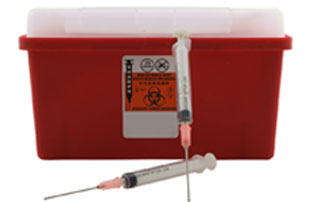What to Do
Get Vaccinated for Hepatitis
- If the person you care for has Hepatitis B – get vaccinated. The vaccine is a series of three shots given over a period of 6 months.
- If the person you care for has Hepatitis A – get vaccinated. The vaccine is a single shot. A second booster is given 6 to 12 months later to ensure long-term protection.
- There is a combined Hepatitis A and B vaccine, called Twinrix®. It includes 3 doses given initially and then at 3 and 6 months.
- There is no vaccine for Hepatitis C.
Accidental Needle Stick
- If you accidentally stick yourself on a dirty needle or lancet, stop what you are doing and wash the injured area with soap and water. Rinse thoroughly
- Call your doctor. The doctor may decide to test you to see if you became infected. The first test will test negative, this is the baseline test. You will need to have tests 6-12 months later to determine if you are infected. It takes several months for the infection to be identified.

Storage of Medical Equipment
Any equipment you use to care for someone should be stored correctly.
- Store medicines in a clean, dry place, away from humidity or moisture. The kitchen is best.
- Keep syringes, dressing supplies, blood or urine test strips in an airtight container (e.g. plastic storage bin). Store in a cool place like a bedroom closet.
Disposal of Waste
Know the laws in your community that regulate disposal of waste. You will dispose of dirty needles, syringes, lancets and other sharps in special plastic sharps containers.
- Since the containers are not recyclable, you may be able to dispose of them in the trash. Check with the local trash company to know how to dispose of a container.
- Some hospitals and pharmacies have sharps disposal programs.
- Many waste management companies allow you to mail the containers for disposal.